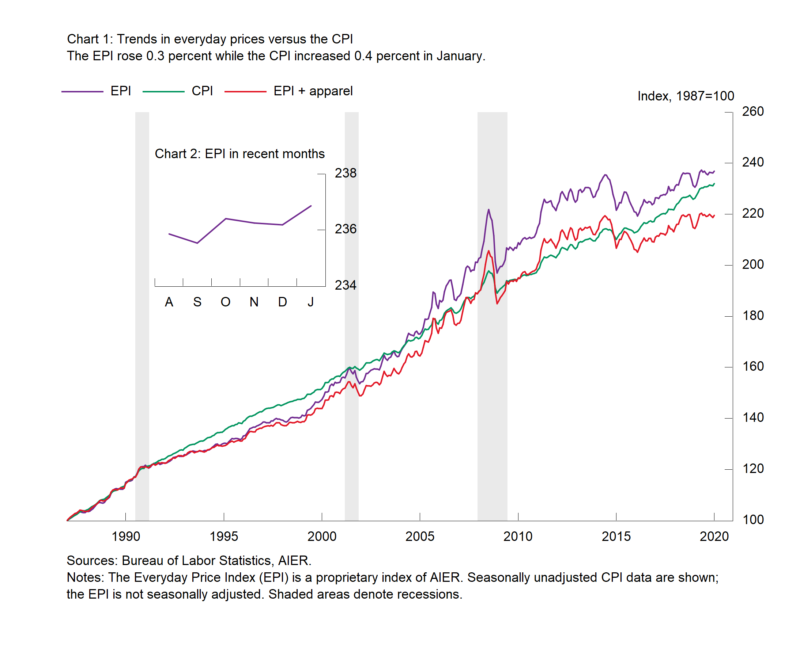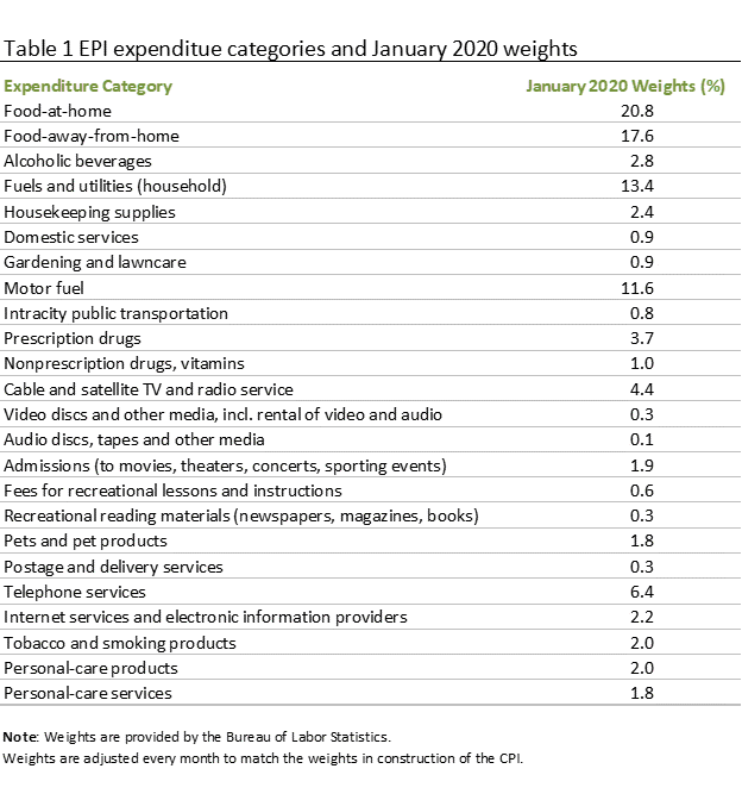Everyday Prices Rise on Gains in Food and Communication Services
AIER’s Everyday Price Index rose 0.3 percent in January after being unchanged in December. The major contributors to the increase were food, household utilities and communication services. Over the past year, the index is up 2.7 percent, the fastest pace since October 2018. The Everyday Price Index measures price changes people see in everyday purchases such as groceries, restaurant meals, gasoline, and utilities. It excludes prices of infrequently purchased, big-ticket items (such as cars, appliances, and furniture) and prices contractually fixed for prolonged periods (such as housing).
The Everyday Price Index including apparel, a broader measure that includes clothing and shoes, increased 0.4 percent in January after back-to-back declines of 0.3 percent in November and December. Apparel prices rose 1.5 percent on a not-seasonally-adjusted basis in January but are still down 1.3 percent over the past year. Apparel prices tend to be volatile, registering sporadic large gains or declines in between stretches of relatively steady prices. Over the past year, the Everyday Price Index including apparel is up 2.4 percent.
The Consumer Price Index, which includes everyday purchases as well as infrequently purchased, big-ticket items and contractually fixed items, rose 0.4 percent in January. The Everyday Price Index is not seasonally adjusted, so we compare it with the unadjusted Consumer Price Index. Over the past year, the Consumer Price Index is up 2.5 percent, the fastest pace since October 2018.
Key contributors to the increase in the Everyday Price Index were food, household utilities and communication services. Food prices overall were up 0.5 percent for the month with food at home (groceries) up 0.6 percent and food away from home (restaurants) rising 0.4 percent. Over the past year, total food prices are up 1.8 percent with groceries up 0.7 percent and restaurants up 3.1 percent.
Household fuels and utilities increased 0.8 percent in January but are up just 0.6 percent over the past year. Motor fuel, the other major energy category in the Everyday Price Index fell 0.8 percent for the month but is up 12.6 percent from a year ago.
Among communication services, telephone services, which includes both landline and wireless, rose 0.3 percent for the month and is up 1.8 percent from a year ago. The gain was completely attributable to a 1.6 percent jump in landline services while wireless services prices were unchanged for the month. Internet services, the other major category of communication services, saw a 0.9 percent gain in January, contributing to the 2.2 percent rise over the past year.
Increases in aggregate price measures have accelerated a bit in recent months. Some of the increase is likely attributable to volatile commodity prices, especially crude oil. West Texas Intermediate crude oil rose from about $53 per barrel in early October 2019 to $63 per barrel in early January. Since then, the price has fallen about 20 percent to around $50 per barrel. The drop is likely to put downward pressure on price aggregates in the coming months. Furthermore, some increases in price aggregates may also be attributable to increased tariffs in the ongoing trade wars between the United States and China.
Despite these forces, the trend rate of increase in many price aggregates remains mild by historical measures and appears unlikely to accelerate dramatically for a sustained period.








